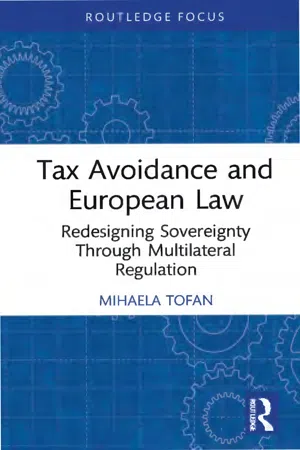
Tax Avoidance and European Law
Redesigning Sovereignty Through Multilateral Regulation
- 126 pages
- English
- ePUB (mobile friendly)
- Available on iOS & Android
About this book
Tax law is one of the legal fields with the most subtle influence on European integration and EU law. The European economic cooperation project emerged with the customs union, essentially a tax law concept, and evolved alongside other topics of tax harmonization. Still, the existence of the EU tax law is disputed. The research on the topic is significant, as the integration of national economies and markets has increased substantially, both within the EU and globally. This has put a strain on domestic tax rules, which are subject to the demands of the international taxation requirements.
This book explores the relationship between tax avoidance regulation and sovereignty within the European Union, analyzing the impact of the effective regulatory methods for limiting and eliminating aggressive tax planning by multinational companies. Focusing on analyzing good practice in fiscal regulation efficiency and the results generated by the tax jurisprudence both at national and European level, its main objective is to present the argument for inter-dependency between taxation and the current changes in the concept of sovereignty. It highlights where fiscal regulation has led to uniform, yet flexible, solutions for the actual fight against companies' abusive fiscal conduct, when taking advantage of tax competition.
This text will be of value to academics, researchers, and advanced students in tax law and tax avoidance regulation and their intersection with sovereignty in the context of the European Union.
Frequently asked questions
- Essential is ideal for learners and professionals who enjoy exploring a wide range of subjects. Access the Essential Library with 800,000+ trusted titles and best-sellers across business, personal growth, and the humanities. Includes unlimited reading time and Standard Read Aloud voice.
- Complete: Perfect for advanced learners and researchers needing full, unrestricted access. Unlock 1.4M+ books across hundreds of subjects, including academic and specialized titles. The Complete Plan also includes advanced features like Premium Read Aloud and Research Assistant.
Please note we cannot support devices running on iOS 13 and Android 7 or earlier. Learn more about using the app.
Information
1 Introduction
- taxation at source of the money jurisdiction
- taxation at the residence jurisdiction of the parties
- taxation at source jurisdiction of the income
- taxation at the investor’s residence jurisdiction, when borrowed capital is used
1.1 Current topics for research in taxation
Table of contents
- Cover
- Half Title
- Series
- Title
- Copyright
- Contents
- 1 Introduction
- 2 The insight of the tax avoidance doctrine
- 3 Challenges for the contemporary taxation systems
- 4 European integration in taxation
- 5 Conclusions and limits of the research
- Bibliography
- Index